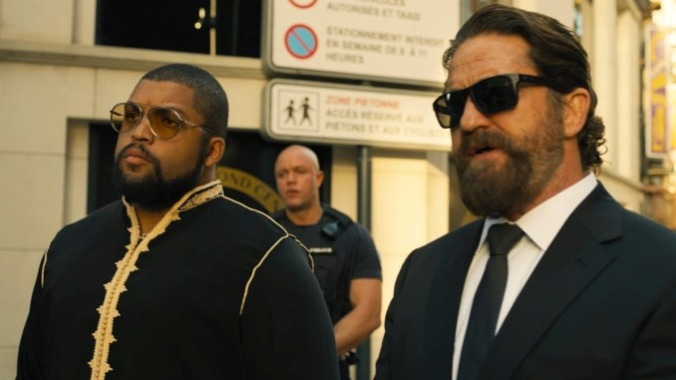Den of Thieves: Pantera Loses Its Surprise but Sustains Its Strangeness

The 2018 crime picture Den of Thieves depended on the element of surprise. Yes, there was a pretty solid twist lurking at the end, and even before that, a less hairpin bait-and-switch where Dirtbag Heat, as so many took to calling it, spent some time morphing into more of a meathead Ocean’s 11. But beyond the actual plotting, there was the broader surprise of a January-released Gerard Butler crime movie rising far above its station into all-season entertainment. Butler had some vulgar-auteurist-style apologists before then, but Den of Thieves felt like a gateway drug, opening people’s minds to an appreciation of his rugged masculinity and his masticating attempt at an American accent. Hell, his subsequent meat-and-potatoes thrillers even seemed to improve, as if reflecting Den’s B-movie glow.
This leaves Den of Thieves: Pantera at something of a stealth disadvantage seven years later. It does enjoy a greater frenzy of anticipation than many Butler programmers, but whether writer-director Christian Gudegast’s influence-mixing storytelling was a conscious strategy, a free-associative grab bag of his favorite movies, or something else entirely, it’s harder to generate that sense of discovery a second time. The discovery I kept waiting for during Den of Thieves: Pantera was a revelation about just what the hell was happening in it.
On the outset, the sequel has a fine side-switching hook. Donnie (O’Shea Jackson Jr.), the secret mastermind behind the previous film’s heist, has absconded to Europe with his riches, but he hasn’t quit the game. The movie opens with a heist that (I think) he plans to use to finance another, much more ambitious heist, a plan that’s complicated by the arrival of “Big” Nick O’Brien (Gerard Butler), the rough-hewn cop he outwitted last time around. It’s not immediately clear what Nick is after as he tracks Donnie down; he doesn’t have jurisdiction in France (or any of the other countries the movie dips into), and the previous heist going according to Donnie’s plan – one that, by its nature, left so little trail that there wasn’t really an official crime for Nick’s department to leave unsolved – isn’t exactly obvious material for hot-blooded revenge, no matter how tempestuous Nick’s demeanor can be. (The movie vaguely implies his dedication to his job in the previous movie cost him his marriage and kids, but the cost-him-his-family scene actually happens pretty early in Den of Thieves, so it’s hard to put that on Donnie.) No, he’s decided that he wants in on the action, and for reasons I wasn’t entirely clear on but welcomed as a chance to get on with it, Donnie cautiously welcomes him into the fold.
The reason may be as simple as Gudegast really likes the diner scene from Heat, and seems hellbent on restaging it however he can, possibly multiple times per movie. Pantera’s best equivalent is a scene between Donnie and Nick after a night of heavy drinking, where they exchange backstories over late-night shawarma. In this scene and a few others like it, Gudegast recklessly and delightfully swerves into the discovery that Butler and Jackson make for a fine buddy duo. Jackson resembles his famous father Ice Cube, of course, but without that trademark scowl, little hints of warmth and amusement flash in his eyes, while Butler achieves peak raffishness: an unkempt beard, countless cigarettes, and wisecracking over the croissant he picks up from the French police. It’s like half-deranged, half-delightful fanfic Gudegast writes about his own characters.
-

-

-

-

-

-

-

-

-

-

-

-

-

-

-

-

-

-

-

-

-

-

-

-

-

-

-

-

-

-

-

-

-

-

-

-

-

-

-

-








































